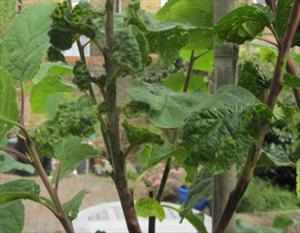 Eriophyid mite damage on a plum tree
Eriophyid mite damage on a plum treeEriophyid mites are microscopic plant parasites, thicker at one end than the other, like miniscule carrots. The damage they cause is cosmetic and not usually worth treating.
The mites spread between plants mostly carried on the wind, but also hitching a ride on passing animals (and humans).
There are many different species, which in some cases are specific to different host plants - apple and plum trees are a common target. They are very widespread and found in most fruit-growing areas.
Since they are so small it is usually not possible to identify these mites without a microscope, but the damage they cause is quite characteristic.
Results of infection and treatment
As these parasites feed the host plant leaves react by curling and distorting. Lesions or galls may also develop on stems and shoots.
In the case of fruit trees the actual damage to the host plant is more cosmetic than serious. No treatment is required.
Even commercial growers generally do not spray against this parasite because it is known to be an alternative food source for predatory mites which are generally beneficial in controlling other, more harmful, mite infections.
See also Walnut blister mite.
